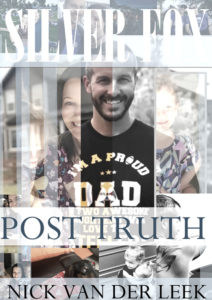Chris Watts always seems like a fish out of water, doesn’t he? He doesn’t seem completely comfortable in many of those Thrive videos. He’s not comfortable in the Sermon on the Porch, although in his shorts and sandals, he’s trying his best to act casual. And in all his interrogations, he seems more focused on trying to appear normal, which of course makes him seem even weirder.

Now that he’s in prison for the rest of his life, he appears – and sounds – more relaxed, and more comfortable than we’ve ever seen him. It’s as if an actual prison is a sort of natural psychological home for him, a place where he can truly be himself, not so much enjoy himself but just be himself.

There’s a stereotype associated with true crime – not in all true crime, but some areas of it – where the quiet, nondescript neighbor that no one noticed before turns out to be the worst monster – a diabolical serial killer, mass shooter or serial rapist of some sort.
This stereotype exists because it’s often true. It’s the invisible introvert who’s capable of a much deeper, and richer inner world than the average person, and so when we translate that capacity to true crime, we get a much darker, and more depraved kind of crime. The Watts Family Murders are a lot like that when you think about it.
On this blog I don’t like to discuss psychology, not because it’s not my thing, but because that’s what the books do. That’s why there are already eight TWO FACE books on this case already [OBLIVION is out tomorrow].
One of the issues I’ve been itching to tackle in more detail is this seemingly unimportant issue of Watts’ personality. He’s an introvert. So what? Well, it’s a major personality type and a major defining trait of this particular murderer – whom no one can understand, and who did something no one can explain. That’s really the final word on this case. No one knows why and no one will ever know.

Rocket Science specializes in these kind of psychological conundrums. In order to prime you for what’s coming in OBLIVION, it’s important that you understand yourself on the introversion/extroversion scale. You may think you do, but this test will make it explicit.


Feel free to share the results of this test, and if you feel the test isn’t an accurate reflection, tell us. If it is, tell us. If you found something out about yourself by taking the test, don’t be shy, don’t be an introvert – tell us!

In the spirit of transparency and full disclosure, I’ll start first. I scored as a:
Public extrovert and private introvert.

I’m not sure it’s true that I’m a wallflower at home [perhaps being an author means you automatically are], but I know in certain situations, public and private, I can be.
Personally I think the litmus test for extroversion/introversion has to do with how one deals with being alone. I have mixed feelings about it. I want my space but also feel lonely at times. Can you be an extrovert and an introvert at the same time? Clearly you can be.
Now in the Watts case, being alone does emerge as a kind of test. We see what Watts does when he’s left alone for five weeks. We see what he does when he’s not home. We also see how Shan’ann tolerates not being alone, as well as how she manages people.
And this is the value of spending some time personalizing these concepts. When we do not only do we get a much deeper grasp on these enigmatic true crime characters and personalities, we also see how and where we [hypothetically] fit into these myriad dynamics.
I also think it’s a spectrum. You’re born on one or the other side of the scale, but it’s a sliding scale, and it can change during the various stages and circumstances of your life.
We saw how Chris Watts seemed to become more extroverted in some ways, and Shan’ann as well. But it’s also a sort of default setting. Especially when things aren’t going the way we want them to. Watts’ introversion feeds into his identify, and without exception, we all default to our identities. In true crime this is especially true, which is why identity is absolutely key to why criminals do what they do.
Understanding identity also helps explain why we do the things we do, or why we feel the way we do about what we do and how we do it.
I love the first line of my result, about the horror of leaving others indifferent. I think Shan’ann also felt that a great deal. Ironically, Watts seemed to feel the opposite way during his Sermon on the Porch, and Confession #1 and 2. It’s as if he wanted people to feel indifferent.
Shan’ann and the kids have disappeared. I’m not sure where they went. But maybe it’s not a big deal…?

Now, in conclusion: is the above test accurate? Was it for you? For me? Well, if you’re a full-time author, yes, you are all about changing hearts and influencing minds, especially in a genre as serious and epic as true crime. Leaving others unchanged or indifferent means your efforts have failed. You have failed. What I don’t like is this idea of needing to be validated externally. My work does, I don’t, but it’s easy to get sucked into OBLIVION [see what I did there…]
Now it’s your turn 😉
More: Introverts run the world — quietly
Raising An Introverted Child In An Extroverted World
“Chris Watts is a narcissistic psychopath”- now find out what YOU are











Recent Comments